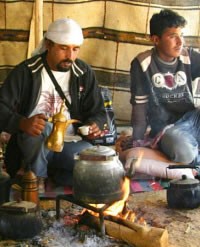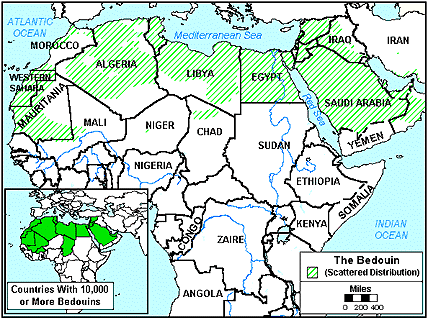The name "Bedouin" is derived from the Arab word bedu. It is a term used to differentiate between those groups who migrate with their herds and those who have settled in an urban or agricultural area. Although distinct, both communities rely on each other economically, socially, and politically.
Most people picture the Bedouin as nomads clothed in long flowing robes, riding across the desert on their camels. However, their identity is much more complex. Today, many Bedouin live as semi-nomads, both migrating with their herds and engaging in some form of settled agriculture. Most Bedouin are organized into tribes, virtually all of which speak Arabic and claim Arab descent.
The Arab conquests of the seventh century brought about a rapid expansion of the Bedouin. At that time, thousands of Bedouin left the Middle East and began spreading across North Africa. They have adapted well to the nomadic or semi-nomadic way of life in the desert. Apart from tribal affiliations, there is little to distinguish one group of Bedouin from another.
In the past, there were tens of thousands of Bedouin in Tunisia. Those statistics relate to the time prior to Tunisia's first president, Habib Bourguiba in 1956. President Bourguiba obligated the Bedouins to urbanize, giving them land to farm and raise cattle. With that, the period of nomad Bedouins ended in Tunisia, and they were called Arabs or urbanized Bedouins.
A few Bedouin are found in the southern areas of the country, such as Sidi Bouzid, Gafsa, Touzeur, and Mednine. We will call them the Rabiya Bedouins.
As Rabiya Bedouins moved into urbanized areas provided by President Bourguiba, they began to blend in with their Tunisian Arab neighbors. Some managed to hold on to some of their traditions and Bedouin clothing. Their celebrations and weddings are particularly distinctive, as they use horses and swords in their parades.
Rabiya Bedouins are a traditional nomadic Bedouin people. They travel between Tunisia and Algeria through the desert. They do not possess birth certificates, passports or identity cards. They move from one place to another, looking for grass for their cattle. Some live in tents, but most consider the sky their roof and the ground their bed. Due to raising livestock, the core of their society is the need for migration, which is determined by the supply of water and the availability of grazing land. Territories belonging to specific tribes are well defined and their boundaries are known to all. Political borders are of little importance to the Bedouin, although various government restrictions are now having more effect on their migratory lifestyle than in times past.
Because food is scarce in the desert regions, Rabiya Bedouins sometimes suffer from hunger. Dairy products are their main food source. Milk from camels and goats is made into yogurt and a type of butter called ghee. The women also bake round loaves of unleavened bread that are made from coarse, stone-ground wheat. Dates and other fruits found in desert oases are also eaten when available. Meat is only served on special occasions such as marriage feasts, ceremonial events, or when guests are present. During such times a young goat, camel or lamb is slaughtered and roasted.
To endure the extreme heat of the desert, the Bedouin wear lightweight, light-colored clothing. It is very loose-fitting, allowing for the circulation of air and freedom of movement, yet providing protection from the sun and windblown sand. Their garments are designed to cover the entire body except for the face, hands and feet. The main garment for men is the cotton thawb, which is a long straight-cut white, brown or gray robe. Over the robe, the men wear long silk or cotton jackets called kibrs. The jackets are open in the front and secured with leather belts.
Rabiya Bedouin children stay with their mothers in the women's section of the tent until they are about seven years old. Older boys often help with the herds and tend to the needs of guests. The women's responsibilities include tending to the children; preparing meals; sewing; collecting and weaving the animal hair; pitching, striking, and loading the tents; gathering fuel for cooking; and nurturing the elderly. Women do most of the work while the men socialize and make plans for the group. Marriage ideally occurs within the extended family. Generally, the father's cousins are the first preference.
Bedouin society is organized according to a series of overlapping kin groups. The family is the smallest unit, followed by the clan then the tribe. In the past, it was shameful for a Bedouin to accept a wage-paying job. Today, however, many have been forced by economic circumstances into full- or part-time employment.
Rabiya Bedouins in Tunisia are Muslims following the teaching of Mohammad, who lived in the 6-7th centuries in Saudi Arabia. They believe in one God, whom they call Allah (Arabic for "the God"). At judgment day, all people will be judged for their deeds and, if their good works outweigh their bad, then Allah will welcome them into paradise. If not, then they will be sentenced to eternal hell. They must follow the five pillars of Islam: prayer five times a day, fasting from dawn to dusk during the month of Ramadan, giving to the poor, and, if possible, a pilgrimage to Mecca, to be done at least once in their lifetime (Hajj). Regarding Jesus, they believe that he was a prophet, but that his teachings are inferior to those of Muhammad.
While most of the Bedouin are Sunni Muslims (mainly of the Malikite branch), there is still a basic belief in spirits known as jinnis. The jinnis are, according to Muslim legend, spirits capable of assuming human or animal form and exercising supernatural influence over humans.
A few of the tribes have been influenced by the mystic tradition in Islam known as Sufism. A Sufi is someone who believes that he has acquired a special inner knowledge direct from Allah.
All the Bedouin groups are basically untouched with the gospel. Although there are resources available in their languages, the Rabiya Bedouin have proved to be resistant to Christ.
Pray that the Lord will raise up long-term workers to each Bedouin tribe in North Africa.
Ask God to raise up prayer teams who will faithfully intercede for the Rabiya Bedouins in Tunisia.
Pray for the Holy Spirit to move in Bedouin hearts, drawing them to Jesus Christ.
Pray for family leaders to have dreams and visions of Jesus that will open their families to the only savior.
Pray for Bedouin disciples who will disciple others.
Scripture Prayers for the Bedouin, Rabiya in Tunisia.
| Profile Source: Joshua Project |











